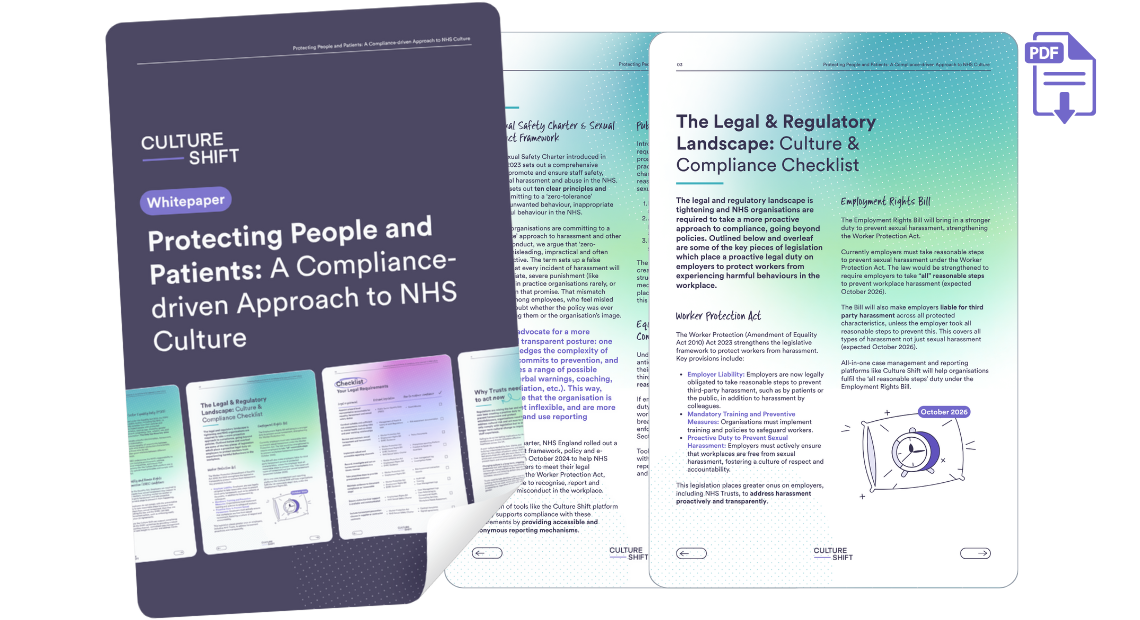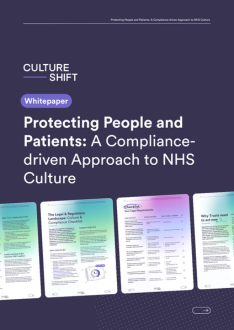What is the NHS Sexual Safety Charter?
The NHS Sexual Safety Charter was launched in 2023 and outlines the NHS’s commitment to taking and enforcing a zero-tolerance approach to unwanted and harmful sexual behaviours in the workplace. The charter outlines 10 core principles with actions to help healthcare organisations achieve this. The aim of the charter is to eradicate sexual harassment and abuse across the healthcare system, ensuring staff safety and promoting a more positive workplace overall.
All NHS Trusts and ambulance bodies have been invited to sign the charter, and to date, more than 270 organisations and 10 ambulance bodies have already done so, demonstrating their commitment to improving sexual safety in the NHS. With rising regulatory requirements, now is the time to ensure your Trust has the systems and processes in place to protect staff, improve reporting and meet legislative expectations.
Why action is urgent
Sexual harassment and violence remain a widespread issue across the healthcare system with large numbers of NHS staff still experiencing bullying, harassment, sexual misconduct and violence from both from service users and colleagues.
- 58,000 NHS staff reported unwanted sexual behaviour (NHS Staff Survey 2024)
- 60% of nurses experienced sexual harassment (Nursing Times 2021)
- 1 in 7 NHS staff faced physical violence in the past year
These behaviours are unacceptable and put Trusts at legal, reputational and workforce risk if left unaddressed.
The compliance challenge NHS Trusts face
Many NHS Trusts are struggling with:
Low levels of confidence in reporting – staff have no consistent way of reporting misconduct and limited anonymous reporting options which leads to an underreporting of sexual harassment. When staff do report, they are not confident their report will be taken seriously or that any action will be taken.
Culture of blame and repercussions for speaking up – staff fear retaliation for speaking up which is another key barrier to reporting
Challenges with reporting mechanisms – many trusts rely on whistleblowing mechanisms or repurposing clinical incident reporting systems to record internal instances of sexual misconduct which are not fit for purpose and can lead to missed reports, eroding trust further in the reporting process.
No centralised case management system – whistleblowing mechanisms and clinical incident reporting systems aren’t built for case management with no clear processes in place and therefore reports often sit unresolved with no communication with reporter.
Limited or no access to accurate data and analytics – Trusts often rely on the annual NHS Staff Survey and have no data of their own which makes it difficult to track trends or have real-time oversight into behaviour occurring so problems escalate before anyone can intervene.
Additional NHS resources:
Discover how The Royal United Hospitals (RUH) Bath NHS Foundation Trust are putting staff wellbeing at the centre of their patient and people strategy.
Read the case studyThe Sexual Safety Charter: 10 Core Principles
- Eradicate abuse – actively work towards eradicating abuse and sexual harassment in the workplace by setting clear standards of behaviour and enforcing policies
- Promote a supportive culture – clear plans to drive cultural change with a focus on prevention
- Adopt an intersectional approach – recognising certain groups will experience sexual harassment at a disproportionate rate. Ensuring equality impact assessments and tailored responses to ensure they are appropriate.
- Provide support – confidential information and resources for those in the workforce who have experienced unwanted, inappropriate behaviour.
- Set clear standards – define and communicate clear behavioural standards, included expected actions of those who witness sexual behaviour.
- Implement clear policies – appropriate, specific and clear policies, including appropriate and timely action against alleged perpetrators.
- Deliver appropriate training – training for all staff to recognise and report sexual misconduct and specialist training for those in specific support roles.
- Establish reporting mechanisms – put anonymous reporting mechanisms in place and ensure reporting channels are widely communicated to ensure awareness.
- Take reports seriously – clear actions and timeframes to ensure sexual misconduct is identified in a timely way and actioned in line with policies, with incidents being escalated appropriately.
- Share data – transparently capture and share data on the prevalence of sexual misconduct, including board level reporting on cases.
To comply with the Sexual Safety Charter every Trust must:
- Implement an anonymous reporting channel
- Put in place a clear, robust case management system
- Be able to access and share accurate data and analytics
- Provide ongoing staff support
- Deliver comprehensive training
Culture Shift can help you achieve all five.
Complete guide to NHS culture & compliance
This report brings together everything leaders need to act now, including a culture & compliance checklist mapping key legislation and how to evidence compliance, and insights from NHS Staff Survey data revealing persistent challenges and underreporting.
Get your free copyHow Culture Shift supports NHS Trusts
Culture Shift are empowering NHS Trusts to comply with new legislation such as the Sexual Safety Charter, Worker Protection Act and the Public Sector Equality Duty, and drive cultural change by providing a compliance-ready platform for preventing and managing bullying, sexual harassment, and misconduct.
Our purpose-built platform can help NHS leaders meet rising regulatory expectations by enabling safe reporting, structured case management, and actionable analytics.
- Reduces barriers to reporting by providing named and anonymous reporting, allowing staff to report confidentially, reducing fear and building trust
- Provides standardised workflows and integrated case management to allow teams to track and manage reports effectively from submission to resolution, standardising processes to ensure consistency and fairness.
- Real-time analytics dashboards and customisable reports which provides instant insight into reporting trends across the trust, eliminating manual data processing and enabling trend monitoring to allow early intervention and targeted prevention.
Culture Shift equips you with the tools to meet NHS regulations, protect your people, and strengthen your workplace culture in one easy-to-use platform – We’d love to show you around!
Book your demo today



